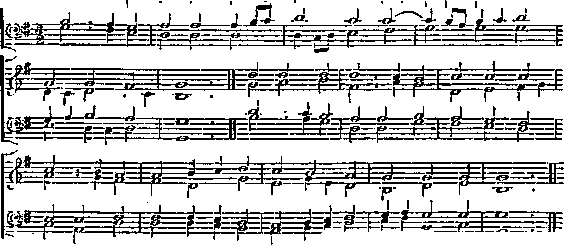Popular Music Of The Olden Time Vol 2
Ancient Songs, Ballads, & Dance Tunes, Sheet Music & Lyrics - online book
| Share page | Visit Us On FB |
|
|
|||||||
|
REIGN OF QUEEN ANNE TO GEORGE II. 697 |
|||||||
|
|
|||||||
|
sharps being in ink of a much darker colour a than other parts. The additions are very perceptible, in spite of Clark's having covered the face of that portion with varnish. In its original state, the " ayre " commenced with these notes:— |
|||||||
|
|
|||||||
|
i§ |
=t |
The g being natural, the resemblance to " God save |
|||||
|
n rl |
|||||||
|
|
|||||||
|
the King " does not strike the ear, but by making the g sharp, and changing the y, hole from an old scale without sharps or flats, into the modern scale of A major (three sharps), the tune becomes essentially like "God save the King." When I reflected further upon the matter, it appeared very improbable that Dr. Bull should have composed a piece for the organ in the modern key of A major. The most curious part of the resemblance between Dr. Bull's ayre and " God save the King" is, that the first phrase consists of six bars, and the second of eight, which similarity does not exist in any other of the airs from which it is supposed to have been taken. It is true, that the eight bars of the second phrase are made out by holding on the final note of the melody through two bars, therefore it differs decidedly from all copies of our more modern tune; but the words may be sung to Dr. Bull's "ayre" by dividing the time of the long notes, —in fact, it has been so performed in public.
My readers may be curious to see the " ayre " as it was sung before the late King of Hanover, at the Concerts of Ancient Music, and at other public concerts ; and I am enabled, through the kindness of Dr. Rimbault, to gratify them. The late R. Clark lent the voice-parts, which had been used on those occasions, to Dr. Rimbault, for performance at his lectures on music in Liverpool. Dr. Rimbault copied them in score for his own use (to conduct the performance), and has favoured me with the following transcript. |
|||||||
|
|
|||||||
|
|
It |
|
|||||
|
$E*EE* |
|
||||||
|
P P PC 1 I I r» -*-F |
I I I |
||||||
 |
|||||||
|
|
|||||||
|
" With regard to the alterations that have been made in tbU manuscript, I offered in the pages otNotesand Queries (2nd S., No. 74) that if Mrs. Clark would submit the maauscript to any competent judges of writing, and they should decide that it has not been tampered with, I would for eit £10 to a charity. This offer was communicated to In Clark, and declined. The manuscript had been in thi possession of Dr. Pepusch until 1752, and " God save tin King" was performed at both the great theatres in' |
i—■--------■--------r
1745. Although some may possess rare books and not acquaint themselves with their contents, Dr. Pepusch can-not be classed among the number ; indeed, he gave Ward the catalogue of contents for his Lives of the 'Gresham Professors, and taught his wife to play from old books of this kind. Had the resemblance of Dr. Bull's "ayre" ■ been then as great to " God save the King" as it now is, I can scarcely imagine it could have escaped his obserr vatioD. Again, while in Br. Kitchener's possession, the |
||||||
|
|
|||||||